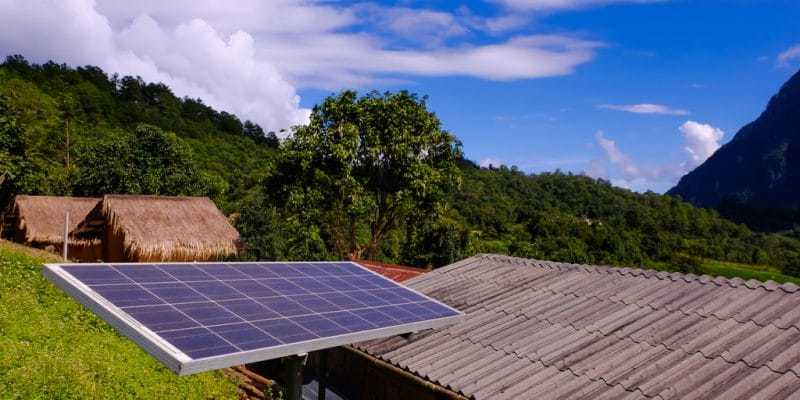Charlie Moir
12 May 2021
The decentralised PAYG solar business model encapsulates many of the conceptual challenges encountered when defining and conducting transformative entrepreneurship. Specifically, regarding the extent to which an enterprise can be perceived as truly transformative, as opposed to merely a perpetuation of the existing system from which an issue has arisen.
Providing a clean decentralised alternative that benefits remote rural communities
The PAYG Solar business model aims to contribute to the achievement of Sustainable Development Goal 7 – “ensure access to affordable, reliable, sustainable and modern energy for all by 2030”. It does so by applying the traditional mobile phone payment model to the solar home system market, essentially aiming to make solar power as financially accessible as the traditional alternatives of kerosene and diesel generators. The model challenges the traditional centralised (often non-renewable) national grid extension method of energy provision by providing a clean decentralised alternative that especially benefits remote rural communities.
Is this innovative focus on electricity decentralisation for social and environmental benefit enough to class PAYG solar providers as a form of transformational entrepreneurship?
Or does it fail to challenge, and in some cases even perpetuate, the existing neoliberal power structures which are often responsible for the environmental and social injustices that transformational entrepreneurship seeks to eradicate? Critics suggests that the provision of public goods, such as electricity, by private-sector enterprises, represents yet another attempt at neoliberal privatisation across the global South. Furthermore, many of the largest PAYG solar providers have direct connections to large corporations that, some would say, have a vested interest in sustaining the systems in which they have grown to be dominant. This is illustrated by the link between the world’s largest PAYG solar provider (M-KOPA) and telecommunications giants Vodafone and Safaricom.
Enterprises may need to utilise aspects of an existing economic system that it ultimately aims to challenge
These critiques require viewing transformative entrepreneurship as a process of “systems change” which aims to find solutions to social issues by addressing the root cause. It is overly reductive to dismiss the prospect of significant environmental and social innovations such as PAYG Solar simply as a neoliberal sleight of hand. Instead, we must be more nuanced in our approach to transformative entrepreneurship and systems change more generally. Sometimes, in order to create largescale meaningful change, enterprises may need to utilise aspects of an existing economic system that it ultimately aims to challenge. However, to do so effectively, transformative entrepreneurs must develop a broad understanding of said system and the relative impacts of the various actors who operate within it. This echoes systems change theory which promotes the important process of “systems mapping” as a means to engage relevant stakeholders into the process of planning a project.
This blog ultimately echoes the conceptualisation of social enterprise as a “cluster concept” emphasising how the contested nature of transformative entrepreneurship requires a broad definitional understanding. However, despite varying approaches, all transformative entrepreneurs, including PAYG Solar enterprises, should garner an in-depth knowledge of the system in which an issue exists and its actors. This will allow them to develop effective solutions, formulate beneficial alliances and avoid potential obstacles during their pursuit of widespread transformative impact.

Charlie Moir is a Master’s student in MSc Prosperity, Innovation and Entrepreneurship at the Institute for Global Prosperity
References:
Abercrombie, R., Harries, E. and Wharton, R., 2015. Systems Change – a guide to what it is and how to do it. [Online]. Available at: <https://www.thinknpc.org/resource-hub/systems-change-a-guide-to-what-it-is-and-how-to-do-it/> [accessed 8 January 2021]
Ballesteros, A., Norford, E., Nagle, T., Yonavjak, L. and Alzner, S., 2013. Implementation strategies for renewable energy services in low-income, rural areas. Issue Brief, Washington DC: World Resources Institute.
Bateman, M., Duvendack, M. and Loubere, N., 2019. Is fin-tech the new panacea for poverty alleviation and local development? Contesting Suri and Jack’s M-Pesa findings published in Science. Review of African Political Economy, 46 (1), pp. 480-495.
Choi, N. and Majumdar, S., 2014. Social entrepreneurship as an essentially contested concept: Opening a new avenue for systematic future research. Journal of Business Venturing, 29 (3), pp. 363-376.
Mader, P., 2017. Public Goods Provision Aided by Microfinance: Groupthink, Ideological Blinkers and Stories of Success. In M. Bateman and K. Maclean, eds. Seduced and Betrayed: Exposing the contemporary microfinance phenomenon. Santa Fe: School of Advanced Research Press, pp. 183-201.
M-KOPA, 2020. About Us. [Online]. Available at: https://m-kopa.com/ [accessed 26 October 2020]
United Nations, 2015. Transforming Our World: the 2030 Agenda for Sustainable Development. [Online]. Available at: https://sdgs.un.org/2030agenda [accessed 26 October 2020]
Yadav, P., Heynen, A. P. and Palit, D., 2019. Pay-As-You-Go financing: A model for viable and widespread deployment of solar home systems in rural India. Energy for Sustainable Development, 48 (1), pp. 139-153.
Fatemeh Sadeghi
30 May 2024 Feminists in the Global South have stepped out of the conventional territories of ‘women’s matters’ into more fund...